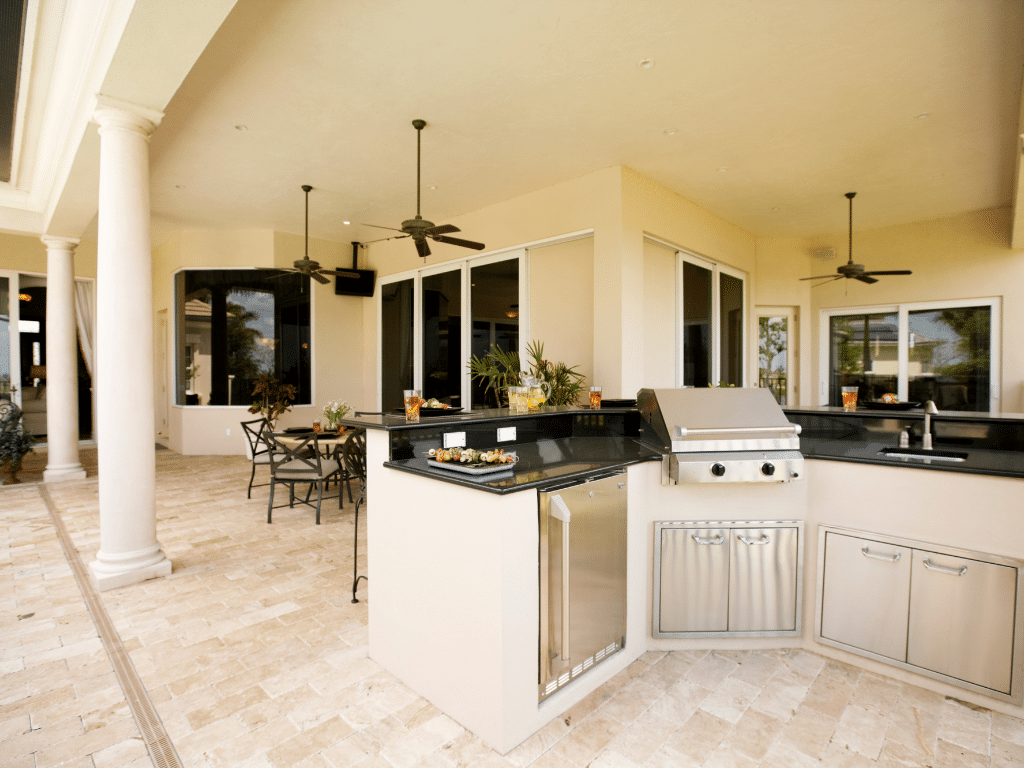
A long-standing symbol of luxury, granite’s features constitute the selling points of living spaces all over the United States. Granite countertops first began to take over as the mainstream countertop material in the 1970s. Each slab of cut granite has a unique look, making the stone one of the most highly coveted materials for its visual appeal.
It is common practice for homeowners to renovate traditional, indoor kitchen spaces to increase home value and improve aesthetic. For the growing numbers that have transitioned to build outdoor kitchen and dining spaces, granite countertops represent nearly anything an outdoor chef would want or need.
Practicalities of Granite
Granite is the result of a natural phenomenon and is sourced from nodes of viscous magma that have cooled and crystallized over a long period of time. The entire process cultivates a set of characteristics that make granite an ideal stone for the following reasons:
● Resistant to heat and direct sunlight
● Stands up to rain and snow
● Retains durability in hot or cold weather
● Resistant to bacteria
The extreme conditions under which granite forms makes for a hardy and durable stone that will preserve the look of any outdoor kitchen and dining space year-round. Additionally, granite forms in nearly hundreds of color varieties and patterns to personalize your outdoor dining aesthetic while tethering the space to the surrounding outdoors.
Proper Care and Maintenance
Due to its natural resistance to most circumstances, granite does not require as much maintenance as other materials for countertops. However, neglect and ignorance can drastically reduce longevity and lead to significant damage. Basic care for granite countertop care remains the same for outdoor and indoor kitchens:
● Clean any spills immediately
● Use cutting boards
● Avoid direct contact with hot pots and pans
● Do not use non-granite-specific cleaners
The primary difference between indoor and outdoor spaces is the likelihood of direct exposure to wildlife and the elements. Weekly cleanings can mitigate potential damage from animal droppings, and covering any exposed areas with tarps provides extra protection from moisture when the space is not in use.
Natural Oil Coatings
Walnut oil, hemp oil, and tung oil are not typically marketed as countertop sealants or coatings, but can also get the job done. These and other types of natural oils dry and polymerize to create a protective surface on stone countertops that repel water just like any other countertop sealant product.
The main distinction for natural oils is their status as the only usable coating completely free of any toxic chemicals. Food products, which include natural oils, must not contain chemicals that cause harmful effects upon ingestion, let alone physical contact.
Alternate Applications
Outdoor dining can ascend to a higher level of beauty with all of what granite provides. Potential applications of granite can extend beyond countertops to set the stage for a consistent and naturally complementary aesthetic.
For homeowners who enjoy hosting small to larger gatherings, guests can immerse themselves in a natural stone-based outdoor dining space. Consider the following ideas for granite features:
● Buffet or serving area to house finished dishes, silverware, and napkins
● Dining area to gather guests around a central location
● Bench seating as an alternative to cushions for a backyard pool
● Bar area to mix and serve drinks
The possibilities for design choices and combinations extend nearly without end. Keeping the color and pattern consistent for every granite feature can contribute to an overall theme and aesthetic to elevate an outdoor dining experience.
Contact Washington Marble Works for a fast and friendly quote to your unique design ideas today.
